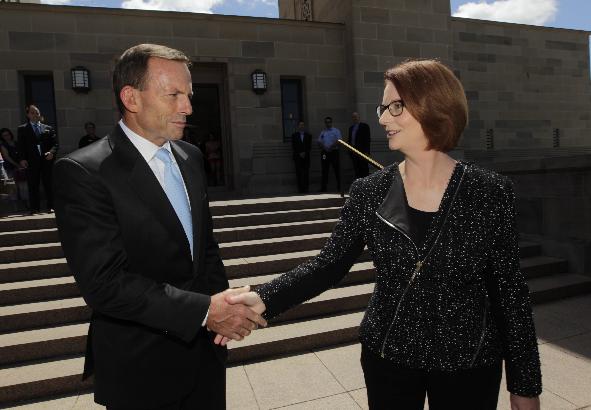Unfortunately political spin doctoring has replaced authenticity; that can only be negative for society. The following article is a good illustration.
By Leo D-Angelo Fisher

Keeping it real … The ‘real’ Tony Abbott greets the ‘real’ Julia Gillard outside the Australian War Memorial in Canberra. Photo: Andrew Meares
Modern political leaders and back-room apparatchiks seem convinced that voters favour style over substance. For some reason, the possibility that voters would welcome leaders with both style and substance is discounted. Professional image-makers believe that when you win the battle of style and image everything else will take care of itself. According to this week’s 2013 Edelman Trust Barometer, the “professionals” are dead wrong. It found that 67 per cent of Australians do not trust government to tell the truth, and more than half (52 per cent) blame poor performance and incompetence as the primary reasons for trusting government less over the past 12 months.
During the 2010 federal election, Prime Minister Julia Gillard was mercilessly pilloried for her mid-campaign declaration that voters would be seeing more of the “real Julia”, which only prompted the bewildered populace to wonder who they had been hearing from previously.
The real Tony
Tony Abbott’s opposition made much capital of Gillard’s absurd pronouncement, but this year Abbott is going down the very same path of presenting the “real Tony” to voters.
Abbott is smart enough not to have spoken those words, but not by much. The ostensibly “leaked” internal email which revealed Abbott’s desire to be portrayed by the media as “a good bloke” and “more fair dinkum” was as good as.
Abbott is determined to shake the damaging “Dr No” tag and to be seen as a modern, inclusive leader, as opposed to the Labor-sponsored reputation of being a “misogynist” with caveman tendencies.
To overturn this image, a strategy every bit as ridiculous and shallow as Gillard’s “real Julia” gambit has unfolded: Abbott’s wife Margie gave a series of interviews and speeches to counter the woman-hating jibes; chief of staff Peta Credlin helpfully revealed that her boss had been very supportive of her attempts to conceive a child through IVF; and Abbott has improbably recast himself as just another battler.
“We’ve struggled with the school fees, we’ve struggled with the hospital bills. We know what it’s like not to be sure whether you’ve got enough money in your bank account at the end of the month,’’ he told a giddy and predictably gullible US-style campaign rally in Sydney.
Voters will also have noticed Abbott’s less combative presentation style, speaking in carefully modulated tones, which to this observer comes across as patronising, studied and reeking of insincerity. It’s the same school-teacher lilt that Gillard employs when she wants to sound statesmanlike.
The Coalition’s policy document, Our Plan: Real Solutions for all Australians, hits all the vote-winning buttons, at least as far as the spin strategists are concerned: “plan”, “real” and “solutions”. All of which, of course, is the antithesis of what the Gillard government represents.
Abbott’s remake is childish in its nakedness, and naive, not to say offensive, in its assumption of how easy it is to manipulate people’s perceptions.
Disdain for voters
But that’s what political leaders believe; that voters are uninterested dullards that can be easily swayed by a few pertinent key messages repeated over and over again, an adjustment to the wardrobe (Gillard’s glasses, Abbott’s blue ties) and what sounds like a Prozac-induced speaking style. Despite the 2010 federal election widely derided as the most vapid in modern political history, precisely because of the corrosive influence of hard-nosed campaign strategists, every indication is that this year’s campaign is going to be just as disingenuous.
Let us not pretend, however, that politicians are alone in treating people with such disdain. The latest incarnation of the “real Julia” and “fair dinkum Tony” bears all the fatuous hallmarks of the makeovers that expensive image consultants are dispensing to corporate executives all the time.
More importantly, the spin-laden pronouncements of political leaders and their corporate counterparts are virtually indistinguishable. Communication has become a strategy rather than a duty or obligation; obfuscation is the default position for any leader addressing an audience; and transparency, accountability and plain speaking are slogans to be observed in the breach.
If politicians and corporate leaders – and for that matter, sports administrators – believe they are getting away with their fakery, they are greatly mistaken.
The Edelman Trust survey reveals a “crisis of leadership in traditional authority figures”, with levels of trust across the institutions of government, business, non-government organisations, and, alas, the media in decline. (In Australia, that is; globally, trust has improved in all four institutions.)
There may be specific reasons for falling levels of confidence in NGOs and the media, but my suspicion is that disaffection with the quality of leadership in business and government has a sapping affect across the community.
In Australia, according to Edelman, 46 per cent of people do not trust business leaders to tell the truth and only 32 per cent believe a chief executive is a credible source of information.
“Australian business and government currently has a leadership vacuum that engagement, integrity and purpose should fill,” the chief executive of Edelman Australia, Michelle Hutton, says. “Re-engaging an otherwise ambivalent public has to start with genuine open dialogue.”
Let’s hope Real Julia and Fair Dinkum Tony are listening. But don’t bet on it.
This article first appeared in BRW on Feb 15, 2013.
© 2013 BRW
